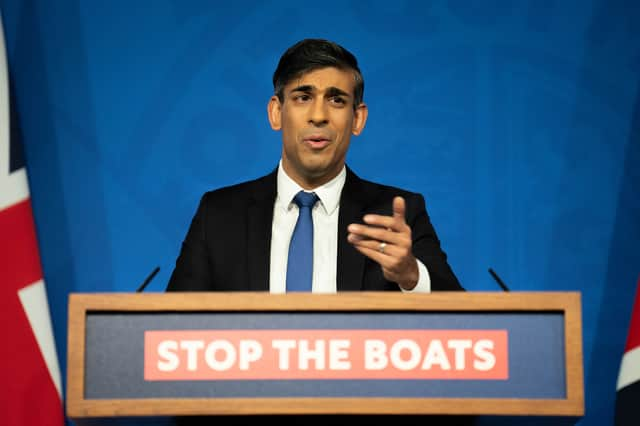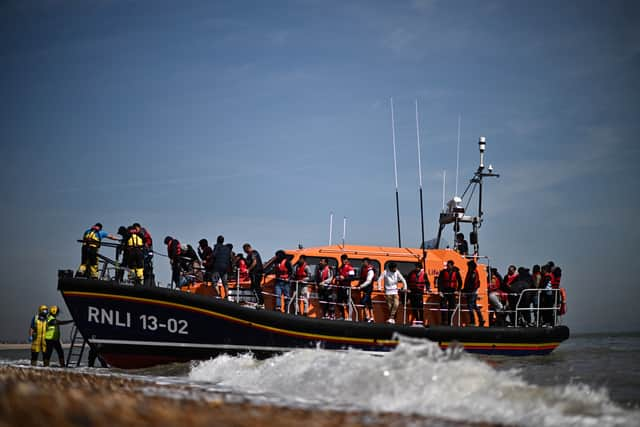The UK and Rwanda - the history between the two nations as asylum seekers plan moves forward


Rwanda has been making headlines in the UK for some time now. Ever since the UK first mooted plans to send asylum seekers there in April 2022, it has been a source of much debate and controversy.
But despite that, Rishi Sunak and the UK government are pressing on with the plans which earlier this week passed its first vote in the House of Commons. Legal challenges were mounted to stop the first flights leaving in June last year and a new treaty has strengthened the whole process and makes clear in UK law that Rwanda is a safe country.
Advertisement
Hide AdAdvertisement
Hide AdIt's all part of a plan to stop asylum seekers coming to the UK in migrant boats across the English Channel. Effectively, the new bill allows British judges and courts to ignore some sections of the UK Human Rights Act. Asylum seekers would still be able to challenge their removal to Rwanda based on their personal circumstances.
No one has been sent to Rwanda yet, but there's no limit on how many people could be. The whole plan may lead you to wonder - as it has for some at NationalWorld - about the history of relations between the East African country and the UK.


The United Kingdom's relations with Rwanda have undergone big changes and periods of challenge. The UK has had a presence in the country for some time too.
Formal relations can be traced back to the pre-independence era when Rwanda was a Belgian-administered territory. It wasn't until 1962 that Rwanda gained independence, setting the stage for the establishment of diplomatic ties with the UK. In these early years, diplomatic exchanges focused on building a foundation for cooperation in various sectors.
Advertisement
Hide AdAdvertisement
Hide AdThroughout the latter half of the 20th century, the UK and Rwanda navigated global shifts in geopolitics. For example, the Cold War era saw diplomatic challenges, as nations aligned themselves with ideological blocs. Rwanda, emerging from colonial history, grappled with its own internal challenges. Despite these circumstances, the two nations maintained a diplomatic dialogue, albeit with fluctuations in intensity.
The post-Cold War period ushered in a new era for UK-Rwanda relations. The focus shifted towards mutual interests in economic development, trade, and government. The United Kingdom became increasingly invested in supporting Rwanda's efforts to rebuild and stabilize after the devastating 1994 genocide. Humanitarian aid and development assistance played a pivotal role, reflecting a shared commitment to fostering stability and growth in the region.
As the 21st century unfolded, the relationship expanded beyond diplomacy. Economic collaboration came to the forefront, with trade agreements and investment initiatives fostering a more robust partnership. The UK recognised Rwanda's potential as a regional economic hub, and the UK became a key ally in supporting the country's economic diversification and infrastructure development.
Humanitarian efforts remained a cornerstone of the bilateral ties, with the UK actively participating in various development projects across Rwanda. From education and healthcare initiatives to collaborative efforts in addressing climate change and promoting sustainable development, the two nations demonstrated a shared commitment to addressing global challenges.
Advertisement
Hide AdAdvertisement
Hide AdIn recent years, the UK and Rwanda were once again aligned due to the Covid-19 pandemic. The collaborative response underscored the importance of global cooperation, with the UK providing support to Rwanda's vaccination efforts and contributing to the country's healthcare infrastructure.
Looking forward, it appears the countries will establish growing economic and diplomatic links in the face of the Rwanda asylum plan.
Comment Guidelines
National World encourages reader discussion on our stories. User feedback, insights and back-and-forth exchanges add a rich layer of context to reporting. Please review our Community Guidelines before commenting.
